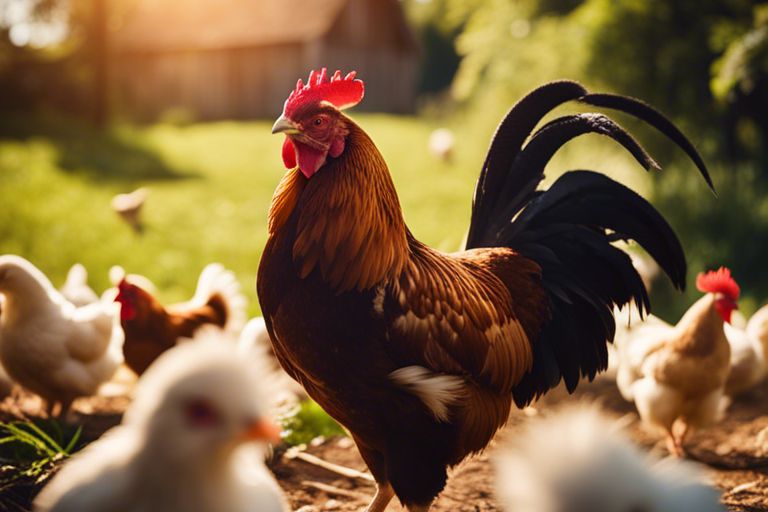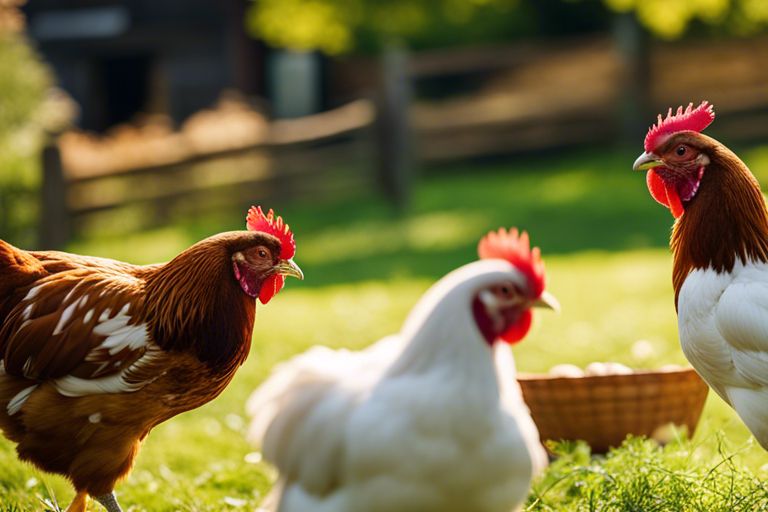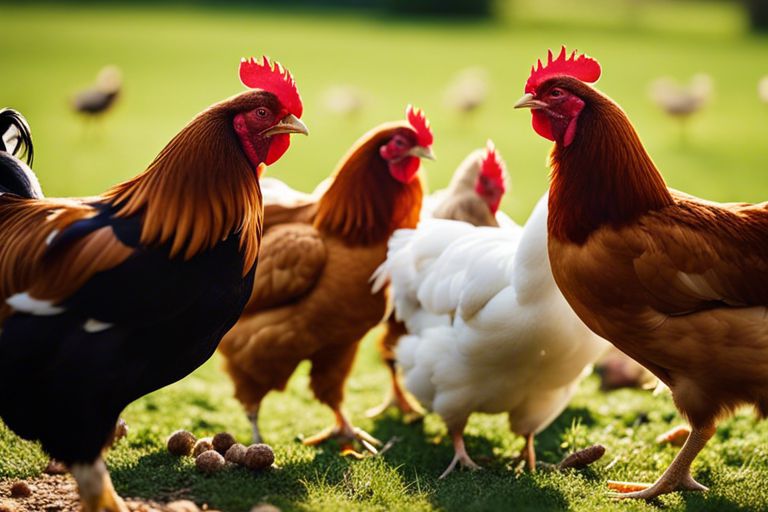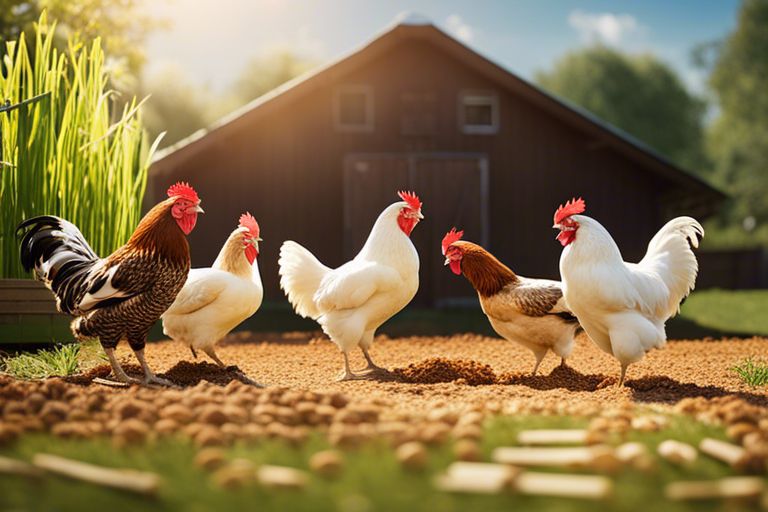Chicken nutrition is a crucial aspect of raising a healthy and thriving flock. Understanding the dietary needs of your chickens is imperative to ensuring they are getting the proper nutrients for growth, egg production, and overall well-being. In this comprehensive guide, we will investigate into the fundamentals of chicken nutrition, including the imperative nutrients, feeding guidelines, and tips to keep your flock healthy and happy. Whether you are a seasoned chicken keeper or new to raising chickens, this guide will provide you with all the information you need to nourish your feathered friends properly.

Understanding Chicken Nutrition
Essential Nutrients for Poultry Health
For optimal health and productivity, it is crucial to provide your chickens with crucial nutrients. These include proteins, carbohydrates, fats, vitamins, minerals, and water. Each nutrient plays a specific role in the overall well-being of your flock, supporting functions such as growth, feather quality, egg production, and immune system health.
Factors Affecting Nutritional Needs
Any poultry owner must consider several factors that can affect the nutritional needs of their chickens. Factors such as age, breed, life stage, environmental temperature, and stress levels all influence the amount and type of nutrients required by the birds. Understanding these factors is key to formulating a balanced diet that meets the specific requirements of your flock.
- Genetics and breed
- Life stage (chick, grower, layer, or broiler)
- Environmental conditions (temperature, humidity)
Needs may vary significantly based on the breed and genetics of the chickens. Different breeds have different nutritional requirements, and factors such as age and life stage also play a crucial role in determining the appropriate diet. Environmental conditions, such as temperature and humidity, can affect how efficiently chickens utilize nutrients in their diet, impacting their overall health and productivity. Any poultry owner must pay close attention to these factors to ensure their flock receives proper nutrition.
- Feeding practices (free-range vs. confined feeding)
- Health status and disease prevention

Types of Chicken Feeds
To ensure the health and productivity of your flock, it is crucial to provide them with a balanced diet. There are various types of chicken feeds available in the market, each serving a different purpose. Understanding the different types of chicken feeds will help you make informed decisions about what to feed your chickens. Any nutrition plan should take into consideration the age, breed, and purpose of your chickens.
Commercial Feed Varieties
Assuming you are considering commercial feeds for your chickens, there are several varieties to choose from. These feeds are formulated to provide chickens with the crucial nutrients they need for growth, egg production, and overall health. Commercial feed varieties include starter crumbles, grower pellets, layer feeds, and broiler feeds. Each type is designed to meet the specific nutritional requirements of chickens at different stages of life.
Pros and Cons of Different Feed Types
| Pros | Cons |
| Convenient and easily accessible | May contain additives or preservatives |
| Formulated to meet specific nutritional needs | Can be more expensive than mixing your own feed |
Chicken feeds come in different forms, each with its own set of advantages and disadvantages. It is crucial to weigh these pros and cons when deciding on the best feed for your flock. Understanding the benefits and drawbacks of each feed type will help you make an informed choice that suits the needs of your chickens.
Pros and Cons of Different Feed Types
| Pros | Cons |
| Convenient and easily accessible | May contain additives or preservatives |
| Formulated to meet specific nutritional needs | Can be more expensive than mixing your own feed |
This breakdown of the pros and cons of different feed types will help you make an informed decision when selecting the right feed for your chickens. Examining the advantages and disadvantages of each feed option will enable you to provide your flock with the best nutrition for their health and well-being.
Step-By-Step Guide to Feeding Your Flock
Now that you have your flock of chickens, it’s imperative to ensure they have a balanced diet to keep them healthy and productive. Follow our step-by-step guide to feeding your flock to meet their nutritional needs and promote their overall well-being.
| Tips for Choosing the Right Feed | Creating a Balanced Feeding Schedule |
Tips for Choosing the Right Feed
Guide your selection of chicken feed by considering the age and purpose of your flock. Layers require feed high in calcium, while chicks need starter feed. Meat birds benefit from a high-protein diet. Assess your flock’s needs and choose feed accordingly. Assume that consulting with a poultry nutrition expert can help tailor your feed selection for optimal results.
Creating a Balanced Feeding Schedule
For a balanced feeding schedule, provide your chickens with access to fresh water and feed at all times. Plan regular feeding times to avoid over or underfeeding. Monitor their intake and adjust as needed to maintain a healthy weight. A balanced schedule ensures your flock receives the imperative nutrients they need for growth, egg production, or meat development.

Additional Nutritional Considerations
Treats and Supplements
Even though treats can be a fun way to bond with your chickens, it’s necessary to ensure they don’t make up more than 10% of your flock’s diet. Healthy options like mealworms, fruits, and vegetables can be great choices. Additionally, supplements such as calcium or probiotics can be beneficial for your chickens’ overall health, but it’s crucial to consult with a poultry nutritionist before adding them to their diet.
Understanding and Preventing Nutritional Disorders
Clearly, understanding the signs of nutritional disorders in chickens is crucial for their well-being. Common disorders like vitamin deficiencies or obesity can have serious consequences if not addressed promptly. Monitoring your flock’s behavior, weight, and egg production can help you detect any imbalances in their diet early on. Consulting with a poultry veterinarian can provide valuable insights and guidance on preventing these issues.
Nutritional disorders in chickens can lead to a range of health issues, affecting their growth, egg production, and overall vitality. Properly balancing their diet with necessary nutrients like protein, vitamins, and minerals is key to ensuring their optimal health and well-being. By being proactive and attentive to your flock’s nutritional needs, you can help them thrive and lead a happy, healthy life.
To wrap up
Summing up, ensuring proper nutrition for your flock is crucial for their health and productivity. By following the guidelines outlined in this comprehensive guide to chicken nutrition, you can be confident that your chickens are getting all the necessary nutrients they need to thrive. From understanding their dietary requirements to providing a balanced diet, every aspect of feeding your flock has been covered. Recall, a well-fed chicken is a happy and healthy chicken!
FAQ
Q: Why is proper nutrition important for chickens?
A: Proper nutrition is crucial for chickens as it ensures their overall health, supports optimal egg production, and helps them maintain a strong immune system.
Q: What are the key nutrients that chickens need in their diet?
A: Chickens require a balanced diet that includes proteins, carbohydrates, fats, vitamins, and minerals to thrive and stay healthy.
Q: How much feed should I give to my chickens?
A: The amount of feed to give to your chickens depends on their age, size, and purpose (laying eggs or meat production). Generally, adult chickens require around 1/4 to 1/3 pounds of feed per day.
Q: What are some common signs of nutritional deficiencies in chickens?
A: Signs of nutritional deficiencies in chickens include poor feather quality, decreased egg production, weight loss, lethargy, and abnormal behaviors.
Q: Can chickens eat table scraps and leftovers?
A: Chickens can consume some table scraps and leftovers, but it’s important to avoid feeding them anything that is spoiled, salty, sugary, or contains caffeine.
Q: How important is access to clean water for chickens’ nutrition?
A: Access to clean and fresh water is crucial for chickens’ digestion, nutrient absorption, regulating body temperature, and overall well-being.
Q: Are there any specific dietary requirements for different stages of a chicken’s life?
A: Yes, there are specific dietary requirements for chicks, pullets, layers, and broilers. These requirements change based on the developmental stage and purpose of the chickens.










